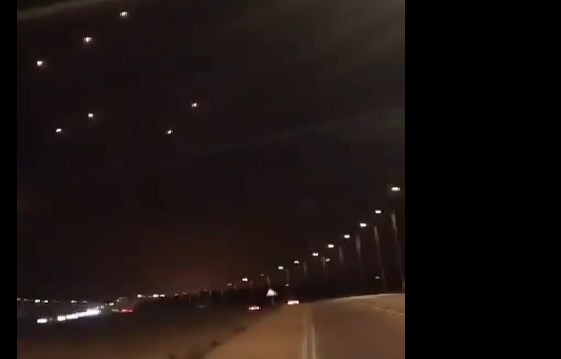Iran, as warned earlier, fired missiles at Israel at 10 PM (IST) in response Israel’s ground offensive in Lebanon to target Hezbollah and days after the militant outfit’s commander Hassan Nasrallah and a top official from Iran’s Islamic Revolutionary Guard were killed in airstrikes on Beirut.
The Israel Defence Forces (IDF) said at 10.08 pm IST that the missiles were fired a “short while ago”. The launch was confirmed by Iran’s official IRNA news agency, which said the country had launched “a missile attack on Tel Aviv” and confirmed by news agency Reuters quoting Israeli media as saying that as many as 100 missiles had been launched.
Videos showed debris from missiles intercepted by Israel’s famed Iron Dome and Arrow defence systems raining down on Tel Aviv. The Israeli defence forces also confirmed that blasts had been heard in “Jerusalem and elsewhere”. There have been no reports of any casualties so far.
“Iran’s attack is continuing. You are requested to remain in a protected space until further notice. The explosions you are hearing are from interceptions or fallen projectiles,” the IDF said in a statement.
Iranian ballistic missile impacts in Israel.
It seems that they are striking numerous targets. pic.twitter.com/7XFNk008Pk
— Global: Military-Info (@Global_Mil_Info) October 1, 2024
However, the Israeli Defense Forces (IDF) have reaffirmed their high state of preparedness and readiness to respond to any attacks from Iran. In response to the escalating situation, Israel has launched a ground offensive in Lebanon, targeting the Iran-backed militia Hezbollah. This move is seen as a direct response to the killing of Hezbollah’s leader, Hassan Nasrallah, in an Israeli air strike last week.
US Backs Israel’s Defensive Measures
The United States and other Western allies have previously stepped in to help defend Israel against a combined Iranian missile and drone attack in April. This attack was launched by Tehran in retaliation for an Israeli strike on the Iranian consulate in Damascus. The US official added, “A direct military attack from Iran against Israel will carry severe consequences for Iran.”
Despite the escalating tensions, Iran has stated that it would not deploy soldiers to confront Israel. However, Iran’s foreign ministry spokesman, Nasser Kanani, has said that local groups possess the capability to defend themselves against aggression. Israeli Prime Minister Benjamin Netanyahu has issued a stark warning to Iran, stating, “There is nowhere in the Middle East, Israel cannot reach.” He also expressed hope for a future when Iran is finally free, predicting that this would come a lot sooner than people think.
The United States has cautiously backed Israel’s move to dismantle Hezbollah’s ability to attack northern Israel, even as President Joe Biden has called for a ceasefire. US Secretary of State Antony Blinken said that Washington was tracking events in the Middle East very closely. He said, “The United States is committed to Israel’s defense.”
US Boosts Military Presence in the Middle East
In a show of support, the US has boosted its forces in the Middle East by a few thousand troops, bringing in new units while extending others that are already there. The Pentagon has also announced the deployment of more fighter jets to the region. US Defense Secretary Lloyd Austin has offered support to his Israeli counterpart Yoav Gallant for dismantling attack infrastructure belonging to Hezbollah along the border with Lebanon.
The escalating conflict has raised fears of a wider regional conflict that the United States and other world powers have said they want to avoid in the Middle East. The situation remains complex and can change quickly depending on the political situation and recent events.
2006 Lebanon War
The current situation bears a striking resemblance to the 2006 Lebanon War, also known as the July War, which was a 34-day military conflict in Lebanon, Northern Israel, and the Golan Heights. The principal parties were Hezbollah paramilitary forces and the Israel Defense Forces (IDF).
The conflict started on 12 July 2006 and continued until a United Nations-brokered ceasefire went into effect in the morning on 14 August 2006, though it formally ended on 8 September 2006 when Israel lifted its naval blockade of Lebanon.
As the world watches with bated breath, the hope is for a swift resolution to the escalating tensions, with diplomatic efforts being made to ensure civilian safety on both sides of the border. The international community is eager to prevent a full-blown conflict that could have devastating consequences for the region and beyond in the form of a Third World War.
The unfolding events serve as a stark reminder of the fragile peace in the Middle East with potential to upset the global order.

